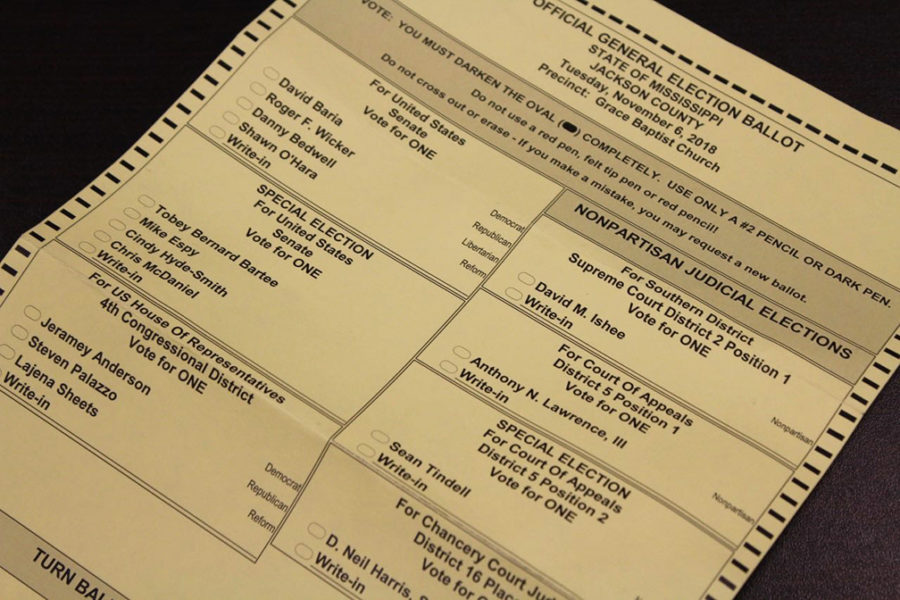The 2018 midterm elections took place Nov. 6, as voters across the country cast their ballots to determine a multitude of state and local elections.
The big news on election night was that Democrats took control of the U.S. House of Representatives, regaining the majority in the lower chamber for the first time since 2011. In the Senate, Republicans retained their majority, flipping seats currently held by Democrats in Indiana, North Dakota and Missouri.
As of now, Democrats have picked up over 30 seats in the House, moving well past the 218 seats needed for control of the chamber. However, as of this publication, at least eight seats have still yet to be called. In the Senate, Republicans are guaranteed at least 51 seats as races in Arizona and Florida have yet to be called and a runoff election will occur in Mississippi later this month.
Democrats also made gains in terms of state governorships. Republicans entered the election controlling 33 out of 50 governorships, with Democrats controlling 16 governorships and one independent governor in Alaska.
On election night, Democrats flipped governor’s seats in Illinois, New Mexico, Kansas, Wisconsin, Michigan, Maine and Nevada. Republicans picked up one governor’s seat in Alaska and one race has yet to be called in Georgia, where Republican Brian Kemp is currently leading. Currently, Republicans will outnumber Democrats 26-23 in terms of governorships once the newly elected governors assume office, though that number will change by one either way once the race in Georgia is called.
In the state of Mississippi, unofficial election results show that incumbent Republican Sen. Roger Wicker defeated Democratic challenger and state representative David Baria 58.8-31.1 percent with about 98 percent of precincts reporting.
Due to the resignation of Thad Cochran due to health reasons in April, voters in Mississippi also voted in a special election to fill the remaining two years of Cochran’s term. Incumbent Republican Sen. Cindy Hyde-Smith and Democrat Mike Espy will advance to a runoff. Hyde-Smith garnered 41 percent of the vote in the initial election, followed by Espy with 40 percent. Republican state senator Chris McDaniel garnered 16.5 percent of the vote and Democrat Tobey Bartee took 1.4 percent of the vote.
As the top two vote earners in the special election, Hyde-Smith and Espy will face off in a runoff election Nov. 27.
In the race for the 4th Congressional District of Mississippi, which encompasses Hattiesburg, incumbent Rep. Steven Palazzo defeated Democratic challenger Jeramey Anderson with 70 percent of the vote. Anderson received 29 percent of the vote, while Reform Party candidate Lajena Sheets received one percent of the vote in the race.
Around the state, incumbent 2nd District Rep. Bennie Thompson and 1st District Rep. Trent Kelly also won re-election in their respective districts. Republican Michael Guest won the open seat in the state’s 3rd Congressional District, where he will replace retiring Republican Rep. Gregg Harper.
With a retained and potentially expanded majority in the Senate, President Donald Trump should have an easier time confirming future judicial and cabinet nominees. In fact, Attorney General Jeff Sessions tendered his resignation to Trump on Nov. 7, setting up a confirmation battle for that position in the near future.
However, the ability for the President to advance key items on his agenda, especially in terms of immigration and health care, will hit a roadblock with a divided Congress ahead. Still, leaders from both parties have expressed a willingness to compromise on certain issues, mainly on infrastructure reform.
The 116th United States Congress will begin Jan. 3, 2019, at which point the newly elected senators and representatives will assume office.
UPDATE: On Nov. 12, the Senate race in Arizona was called in favor of Democrat Kyrsten Sinema. The race in Florida has still yet to be called as of this time.




































